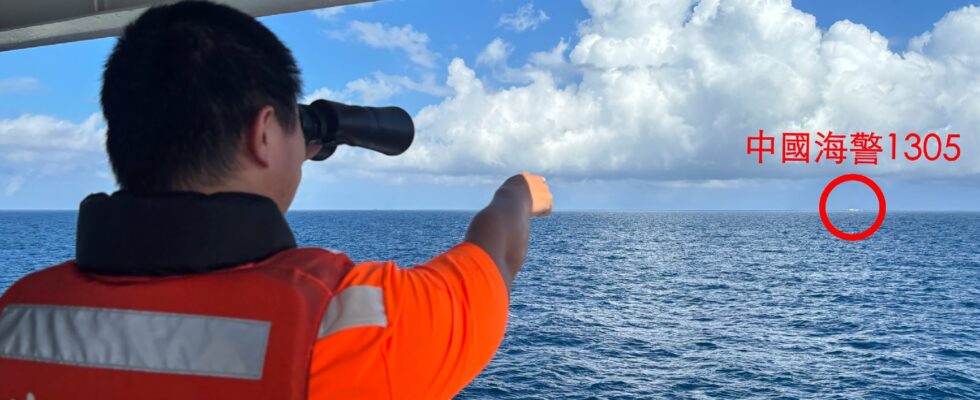China deployed planes and ships this Monday, October 14, to encircle Taiwan as part of a military operation intended to be a “serious warning” to “separatists” on the island and which arouses concern in Washington. The United States, which had warned on Friday against any “provocation” from Beijing towards Taipei after acrimonious exchanges between the two neighbors, denounced “unjustified” operations which represent a “risk of escalation” . Washington has recognized Beijing to the detriment of Taipei as a legitimate power since 1979, but remains Taiwan’s most powerful ally and its main arms supplier.
China called these new exercises “serious warnings” against the “separatist actions of the ‘Taiwan independence’ forces”. “This is a legitimate and necessary operation to safeguard state sovereignty and national unity,” said Captain Li Xi, spokesperson for the Chinese army’s Eastern Command. “Fighters, bombers” and other attack aircraft were deployed, as well as “several destroyers and frigates,” said Chinese public television CCTV.
Taiwanese President Lai Ching-te called a security meeting in the face of these maneuvers which “contradict international law”, according to security chief Joseph Wu. “In the face of external threats, I would like to assure my compatriots that the government will continue to uphold the democratic and free constitutional system, protect a democratic Taiwan and safeguard national security,” Lai Ching-te said in a Facebook post.
The exercises, called Joint Sword-2024B, are taking place “in areas to the north, south and east of the island of Taiwan”, explained Captain Li Xi. They “focus on sea-air combat readiness patrols, the blockade of ports and key areas” or even “the assault of maritime and land targets”, he added.
“Irrational behavior”
The Taiwanese Ministry of Defense condemned “irrational and provocative behavior” by Beijing, ensuring that it had “deployed the adequate forces to respond appropriately in order to protect freedom and democracy, as well as to defend the sovereignty” of Taiwan . “Faced with the enemy threat, all the country’s officers and soldiers are ready,” he added in a statement. The Taiwanese islands on the outskirts of the main island, such as Penghu, Kinmen and Matsu, the latter two located very close to the Chinese coast, have been placed on a state of “heightened alert”, he said.
An AFP team near Hsinchu Air Base in northern Taiwan saw four fighter jets take off on Monday. The Chinese coast guard, for its part, explained that it had initiated “inspections of law enforcement in the waters surrounding the island of Taiwan”. The Taiwanese coast guard confirmed the presence of vessels from their Chinese counterparts. “Several boats” crossed the median line of the Taiwan Strait, in reference to the line, not recognized by Beijing, which cuts the maritime space between the island and mainland China in two, they said in a statement.
China considers Taiwan as a part of its territory to be reunified one day and, although it favors a peaceful solution, has never renounced the use of military force to regain control. It has increased the pressure in recent years by strengthening its military activity around the island.
China has organized three series of large-scale maneuvers in the last two years, using its air force and navy to encircle the island, after, according to it, “provocations” from the Taiwanese authorities. On Sunday, the Taiwanese army claimed to be “on alert” after detecting the Chinese aircraft carrier Liaoning to the south of the island.
“Separatist”
Relations between Beijing and Taipei have been execrable since 2016 and the arrival as Taiwanese president of Tsai Ing-wen, then of her successor Lai Ching-te in 2024. Invested in May, the latter pledged on Thursday to “resist “the Chinese annexation” of the island or “the encroachment of (its) sovereignty”, during the Taiwanese national day. Beijing, which describes Lai Ching-te as a “separatist”, reacted by warning that the Taiwanese president’s “provocations” would lead to a “disaster” for his people.
In a video published by Chinese state media, Lt. Col. Fu Zhengnan, a researcher at the Chinese Academy of Military Sciences, said these exercises could “transform into combat at any time.” “If Taiwan separatists provoke (China) once,” Chinese troops around the island “will take action,” he assured. “I’m not going to panic too much because they often do maneuvers,” Benjamin Hsiao, a resident of Taipei, told AFP. “I’m a little insensitive to it,” added this engineer.
China regularly accuses the current Taiwanese authorities of wanting to deepen the cultural separation between the island and the continent. Disputes between Beijing and Taipei date back to the long civil war which pitted communist fighters led by Mao Tse-tung against the nationalist forces of Chiang Kai-shek. Defeated by the communists, who founded the People’s Republic of China on October 1, 1949, the nationalists took refuge with many civilians in Taiwan, one of the only parts of the national territory then not conquered by the forces of Mao Tse-tung .
